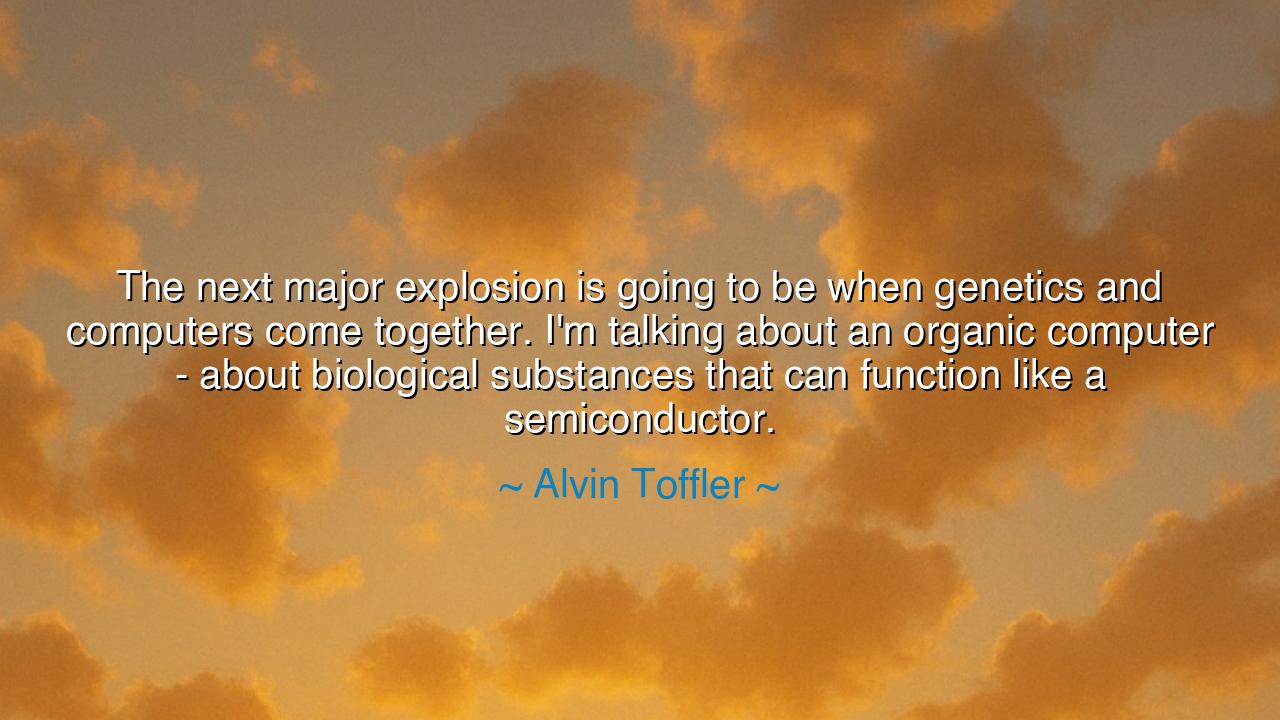
The next major explosion is going to be when genetics and
The next major explosion is going to be when genetics and computers come together. I'm talking about an organic computer - about biological substances that can function like a semiconductor.






When Alvin Toffler spoke the words, “The next major explosion is going to be when genetics and computers come together. I’m talking about an organic computer — about biological substances that can function like a semiconductor,” he was not merely predicting a technological event. He was prophesying a revolution of life itself, a convergence between the living and the mechanical, between nature and machine. Toffler, one of the great visionaries of the twentieth century, foresaw that the future would not be made of steel and silicon alone — it would pulse with the rhythms of DNA, the living code of existence. His words, spoken decades ago, ring now with the resonance of prophecy fulfilled.
In the age of steam, man conquered distance; in the age of electricity, he conquered speed. But Toffler’s vision looked beyond the mechanical triumphs of the past. He saw that the next explosion would not merely change how we move or communicate — it would change what we are. The fusion of genetics and computers represents not just an advance in science, but a crossing of boundaries once deemed sacred. For the first time, man would hold in his hands the power to reprogram life as he once reprogrammed machines. This, Toffler knew, was both magnificent and perilous — a moment when human ingenuity could either elevate creation or corrupt it.
The seeds of his prophecy were already sown in his time. In the late 20th century, scientists cracked the genetic code, revealing that life itself is written in a language — a sequence of information, not unlike the binary patterns that guide computers. Toffler saw in this revelation a cosmic symmetry: DNA and data were siblings, both vessels of coded intelligence. If one could translate life into numbers and numbers into life, then humanity would awaken a new kind of intelligence — the organic computer, the synthesis of biology and technology.
And indeed, history moved as he foretold. The Human Genome Project mapped the blueprint of humanity, while computer scientists learned to simulate neural networks modeled after the human brain. Later, biotechnologists began creating circuits within living cells, programming bacteria to compute, to remember, to heal. The barrier between the mechanical and the biological began to blur. In laboratories across the world, life itself became a collaborator in computation. What once was fiction — computers made of living tissue, DNA that stores data like hard drives — is now emerging as reality.
Yet Toffler’s wisdom goes deeper than prediction; it is a call to moral vigilance. Every great explosion of knowledge carries both creation and destruction in its fire. The fusion of genetics and computing could cure disease and extend life — or it could unleash new forms of control and manipulation beyond imagination. The ancients feared Prometheus, who stole fire from the gods; in our time, that fire burns in the circuits of living matter. Toffler’s insight warns us: progress without conscience is peril. The machine learns, but it does not love; the genome adapts, but it does not choose. Only humanity, with its moral compass intact, can guide this union toward light rather than shadow.
Consider the story of CRISPR, the gene-editing technology that allows scientists to rewrite the very letters of life. When it was discovered, it was hailed as a miracle — and rightly so. Diseases once thought incurable began to fall. Yet the same tool, used without restraint, threatens to reshape the essence of humanity itself. In 2018, a scientist in China edited the DNA of human embryos, crossing a line that even the boldest feared to approach. The world recoiled. Toffler’s vision was upon us — not as a distant dream, but as an ethical trial. We had reached the point where knowledge demands wisdom.
The meaning of Toffler’s quote, then, is not simply technological — it is existential. He reminds us that the destiny of the human race is not only to create, but to understand what we create. The merging of man and machine is not the end of the story, but the beginning of a deeper question: What does it mean to be alive? When computers breathe, when genes compute, when intelligence itself grows from flesh and fiber — will we remember the sacredness of life, or will we treat it as another circuit to command?
The lesson, dear listener, is this: as our creations evolve, so must our hearts. We stand at the threshold of a new world, one in which the organic and the synthetic will intertwine like the twin strands of DNA. To walk through that door wisely, we must bring not only curiosity but reverence — for life, for balance, for the mystery that still eludes us.
Practical actions for the mindful generation:
-
Learn to question technology with both intellect and conscience; ask not only “Can we?” but “Should we?”
-
Celebrate science, but never forget its purpose: to serve life, not to master it.
-
Support education that unites the disciplines — biology with ethics, technology with philosophy — so that wisdom grows alongside innovation.
-
Above all, honor the spark of life within yourself; for in the age of organic computers, the greatest miracle remains the human heart that feels and chooses.
For as Toffler foresaw, the coming explosion will not merely reshape machines — it will redefine humanity itself. Whether that future is a garden or a wasteland depends not on what we invent, but on who we choose to become.






AAdministratorAdministrator
Welcome, honored guests. Please leave a comment, we will respond soon